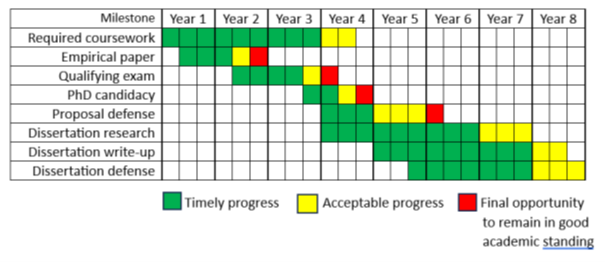The Sociology Department offers a Doctorate (PhD) and a Masters (MA), but these two degrees are part of one seamless graduate program in which all students are working towards a PhD and admitted directly to the PhD program. The Masters degree and its requisite requirements are all requirements for the PhD. (Students who already have a Masters degree when they enter the program typically use courses from their prior degree to fulfill some IU course requirements for the PhD.)
Progression through the program can be divided into two main stages: an early, more structured stage and a later, candidacy stage. In the early stage, students are working towards three milestones, completing required coursework, an empirical paper (formerly known as the MA paper or essay), and a qualifying exam.
After completing these early milestones, students become PhD candidates and are considered “ABD” – “all but dissertation.” The two milestones for this later, candidacy stage include the dissertation proposal defense and dissertation defense. PhD candidates spend most of their time between these milestones, collecting and analyzing data for the dissertation and writing it up.
Students typically take seven to eight years to earn the PhD. To help student students meet this long-term goal, there is a timeline for when milestones should be completed along the way. The first milestone is the empirical paper, which students are expected to complete in their second year. Students should finish required coursework and take the qualifying exam in their third year. Students formally become candidates in their fourth year and should defend their proposal by their fifth year.

 The College of Arts
The College of Arts